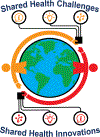Reciprocal innovation: A new approach to equitable and mutually beneficial global health partnerships
- PMID: 35877989
- PMCID: PMC9873831
- DOI: 10.1080/17441692.2022.2102202
Reciprocal innovation: A new approach to equitable and mutually beneficial global health partnerships
Abstract
Global health researchers often discount mutual learning and benefit to address shared health challenges across high and low- and middle-income settings. Drawing from a 30-year partnership called AMPATH that started between Indiana University in the US and Moi University in Kenya, we describe an innovative approach and program for mutual learning and benefit coined 'reciprocal innovation.' Reciprocal innovation harnesses a bidirectional, co-constituted, and iterative exchange of ideas, resources, and innovations to address shared health challenges across diverse global settings. The success of AMPATH in Kenya, particularly in HIV/AIDS and community health, resulted in several innovations being 'brought back' to the US. To promote the bidirectional flow of learning and innovations, the Indiana CTSI reciprocal innovation program hosts annual meetings of multinational researchers and practitioners to identify shared health challenges, supports pilot grants for projects with reciprocal exchange and benefit, and produces educational and training materials for investigators. The transformative power of global health to address systemic health inequities embraces equitable and reciprocal partnerships with mutual benefit across countries and communities of academics, practitioners, and policymakers. Leveraging a long-standing partnership, the Indiana CTSI has built a reciprocal innovation program with promise to redefine global health for shared wellbeing at a global scale.
Keywords: Reciprocal innovation; global health; global learning; global local; mutual benefit.
Conflict of interest statement
Declaration of interest statement
The authors report there are no competing interests to declare.
Figures


Similar articles
-
Advancing Cardiovascular Health Equity Globally Through Digital Technologies.J Am Heart Assoc. 2024 Jan 16;13(2):e031237. doi: 10.1161/JAHA.123.031237. Epub 2024 Jan 16. J Am Heart Assoc. 2024. PMID: 38226506 Free PMC article. Review.
-
A Global Health Reciprocal Innovation grant programme: 5-year review with lessons learnt.BMJ Glob Health. 2023 Nov;8(Suppl 7):e013585. doi: 10.1136/bmjgh-2023-013585. BMJ Glob Health. 2023. PMID: 37977589 Free PMC article.
-
Building and Sustaining Effective Partnerships for Training the Next Generation of Global Health Leaders.Ann Glob Health. 2021 Jul 12;87(1):66. doi: 10.5334/aogh.3214. eCollection 2021. Ann Glob Health. 2021. PMID: 34307069 Free PMC article.
-
Pepea Pamoja:† Applying the Ecological Validity Framework to co-develop a wellbeing and behavioural training program for caregivers of young children with autism in low-resource settings of Kenya and the United States.Child Care Health Dev. 2024 Jul;50(4):e13299. doi: 10.1111/cch.13299. Child Care Health Dev. 2024. PMID: 38967420
-
Reciprocal coproduction as a basis for the diffusion of global health innovations.BMJ Glob Health. 2023 Oct;8(Suppl 7):e013134. doi: 10.1136/bmjgh-2023-013134. BMJ Glob Health. 2023. PMID: 37793816 Free PMC article. Review.
Cited by
-
Looking back to see forward: multidirectional learning between the US Ryan White HIV/AIDS Program and the US President's Emergency Plan for AIDS Relief.BMJ Glob Health. 2024 Feb 23;8(Suppl 7):e013953. doi: 10.1136/bmjgh-2023-013953. BMJ Glob Health. 2024. PMID: 38395451 Free PMC article.
-
Invited commentary on: Mentoring approaches in a safe surgery program in Tanzania: Lessons learned during Covid-19 and recommendations for the future.Surg Open Sci. 2023 Oct 6;16:136-137. doi: 10.1016/j.sopen.2023.10.003. eCollection 2023 Dec. Surg Open Sci. 2023. PMID: 37928314 Free PMC article. No abstract available.
-
Reimagining Global Health: Accelerating Change for a Sustainable Future.Ann Glob Health. 2025 Jan 25;91(1):6. doi: 10.5334/aogh.4616. eCollection 2025. Ann Glob Health. 2025. PMID: 39896102 Free PMC article.
-
Advancing Cardiovascular Health Equity Globally Through Digital Technologies.J Am Heart Assoc. 2024 Jan 16;13(2):e031237. doi: 10.1161/JAHA.123.031237. Epub 2024 Jan 16. J Am Heart Assoc. 2024. PMID: 38226506 Free PMC article. Review.
-
Bringing Generalists to Global Health: a Missed Opportunity and Call to Action.J Gen Intern Med. 2024 Aug;39(10):1901-1904. doi: 10.1007/s11606-023-08573-x. Epub 2023 Dec 22. J Gen Intern Med. 2024. PMID: 38135777 Free PMC article.
References
-
- Ballard M, Bancroft E, Nesbit J, Johnson A, Holeman I, Foth J, Rogers D, Yang J, Nardella J, Olsen H, Raghavan M, Panjabi R, Alban R, Malaba S, Christiansen M, Rapp S, Schechter J, Aylward P, Rogers A, Sebisaho J, Ako C, Choudhury N, Westgate C, Mbeya J, Schwarz R, Bonds MH, Adamjee R, Bishop J, Yembrick A, Flood D, McLaughlin M, & Palazuelos D (2020). Prioritising the role of community health workers in the COVID-19 response. BMJ Glob Health, 5(6). 10.1136/bmjgh-2020-002550 - DOI - PMC - PubMed
-
- Bhattacharyya O, Wu D, Mossman K, Hayden L, Gill P, Cheng YL, Daar A, Soman D, Synowiec C, Taylor A, Wong J, von Zedtwitz M, Zlotkin S, Mitchell W, & McGahan A (2017). Criteria to assess potential reverse innovations: opportunities for shared learning between high- and low-income countries. Global Health, 13(1), 4. 10.1186/s12992-016-0225-1 - DOI - PMC - PubMed
Publication types
MeSH terms
Grants and funding
LinkOut - more resources
Full Text Sources
Medical
